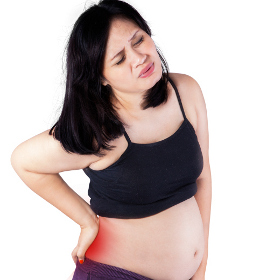Back pain during early pregnancy is one of the most common complaints by expecting mothers. If you are wondering about its treatment, then this article will help solve your problem.

Back pain is seen in around 80% of expecting women in the early stage of pregnancy. Lower back pain is an early sign of pregnancy before missed period. Many women tend to be worried of the back pain during this time.
Causes
Nausea, vomiting, constipation, tender breasts and many other discomforting feelings are common symptoms of pregnancy. However, back pain is the one that causes considerable discomfort to the mums-to-be.
Stretching
A common reason is the stretching of ligaments around the abdominal area. This is a natural phenomenon that prepares the body for the long process of fetal growth that will occur over time.
Center of Gravity
The center of gravity of the body starts moving forward along with the expanding uterus. This leads to change in posture, which in turn causes this problem in pregnant women.
Extra Weight
The developing fetus puts extra pressure and weight on the spinal cord. Few women also tend to put on weight. The back has to support the mother's and the baby's increasing weight, thus leading to pain in that area.
Hormones
Hormones play havoc in an expecting mum's body. Hormones like progesterone soften the ligaments in the pelvic area and the joints become loose. This is to prepare the body to accommodate the growing baby in the uterus. This loosening and shifting of the ligaments and joints cause pregnancy back pain.
Urinary Tract Infections
Women are more prone to urinary tract infections during pregnancy. This bacterial infection causes this condition in early pregnancy.
Posture
Women tend to bend backwards or forward due to the weight of their swelling tummies. This poor posture causes pain in back.
Stress
The mental and physical stress of the body affects the weak pelvic area of the body. This stress leads to such back problems.
Treatment
It is not possible to prevent it completely, but you can take certain steps to reduce the intensity and frequency of the back pain. If you are suffering from it, you may want to consider the following steps under the guidance of your doctor:
- Drink plenty of fluids to keep the urinary tract free from bacteria. Frequent urination will help in reducing urinary tract infection that causes this problem.
- Do not bend over to pick anything from the floor. Instead squat down to reduce the pressure on your back. Avoid picking or lifting heavy objects as it is not only harmful for your back but for your fetus as well.
- Give your back plenty of rest and avoid standing or sitting in the same position for long period of time. While sleeping keep your legs elevated and avoid sleeping on your back for a long time.
- Under the guidance of your doctor use a support belt for your lower abdomen.
- Stop wearing heels and shoes that do not provide adequate support to your back. Heels tend to elevate it as they affect your posture.
- Roll over to your side while getting out of bed. Bend your knees and hips and with the help of your arm push yourself out of bed. Dangle your lower legs over the side of the bed and get up slowly.
- Sit on a chair that supports your back and place a small pillow behind your lower back. Keep your feet in a slightly elevated position. While standing, rest the foot on a low step stool and keep changing the feet frequently.
- Apply heat pad to your back to provide relief to the discomfort. You can also apply ice pack alternating with heat compression. You can ask someone to rub your back to help reduce the pain.
- Exercises like swimming, walking and other physical activity may help build your back stronger and reduce pain. You can try pelvic tilt exercise, cardiovascular exercises, stretching and strengthening exercises to relieve this pain. Remember, it is very important to carry out any form of pregnancy exercises under the strict guidance of your doctor.
You can ask your doctor to prescribe medications to relieve pain. Do not take any medications without the consent of your doctor as it may be harmful for your fetus. It is a common discomfort faced by mums-to-be. But, do not take this pain lightly. If you have any doubts or fears regarding this, speak to your doctor. Keep in mind that when you are pregnant both the safety of your fetus and your health should be given equal importance and care.


 Back pain is seen in around 80% of expecting women in the early stage of pregnancy. Lower back pain is an early sign of pregnancy before missed period. Many women tend to be worried of the back pain during this time.
Back pain is seen in around 80% of expecting women in the early stage of pregnancy. Lower back pain is an early sign of pregnancy before missed period. Many women tend to be worried of the back pain during this time.